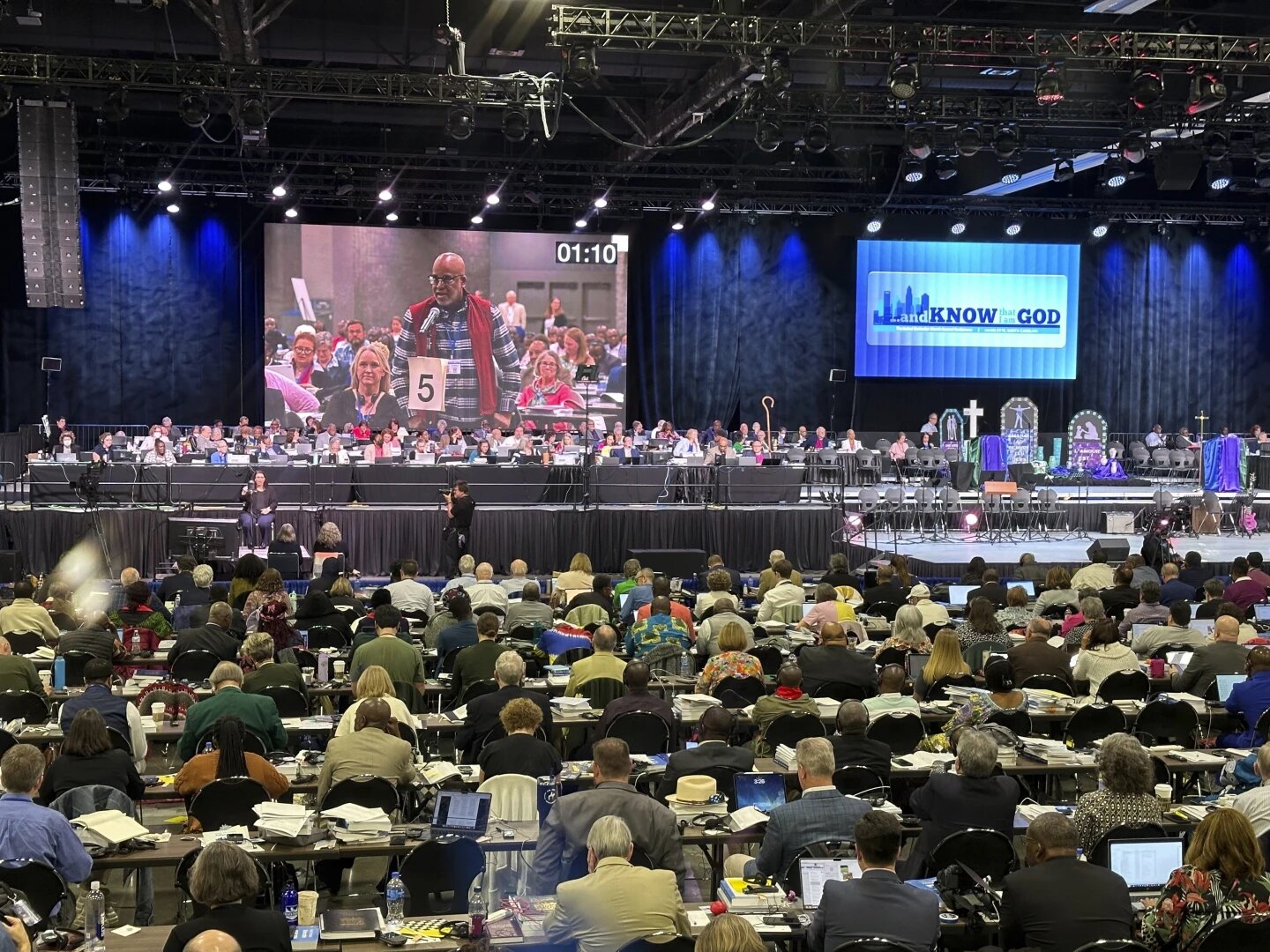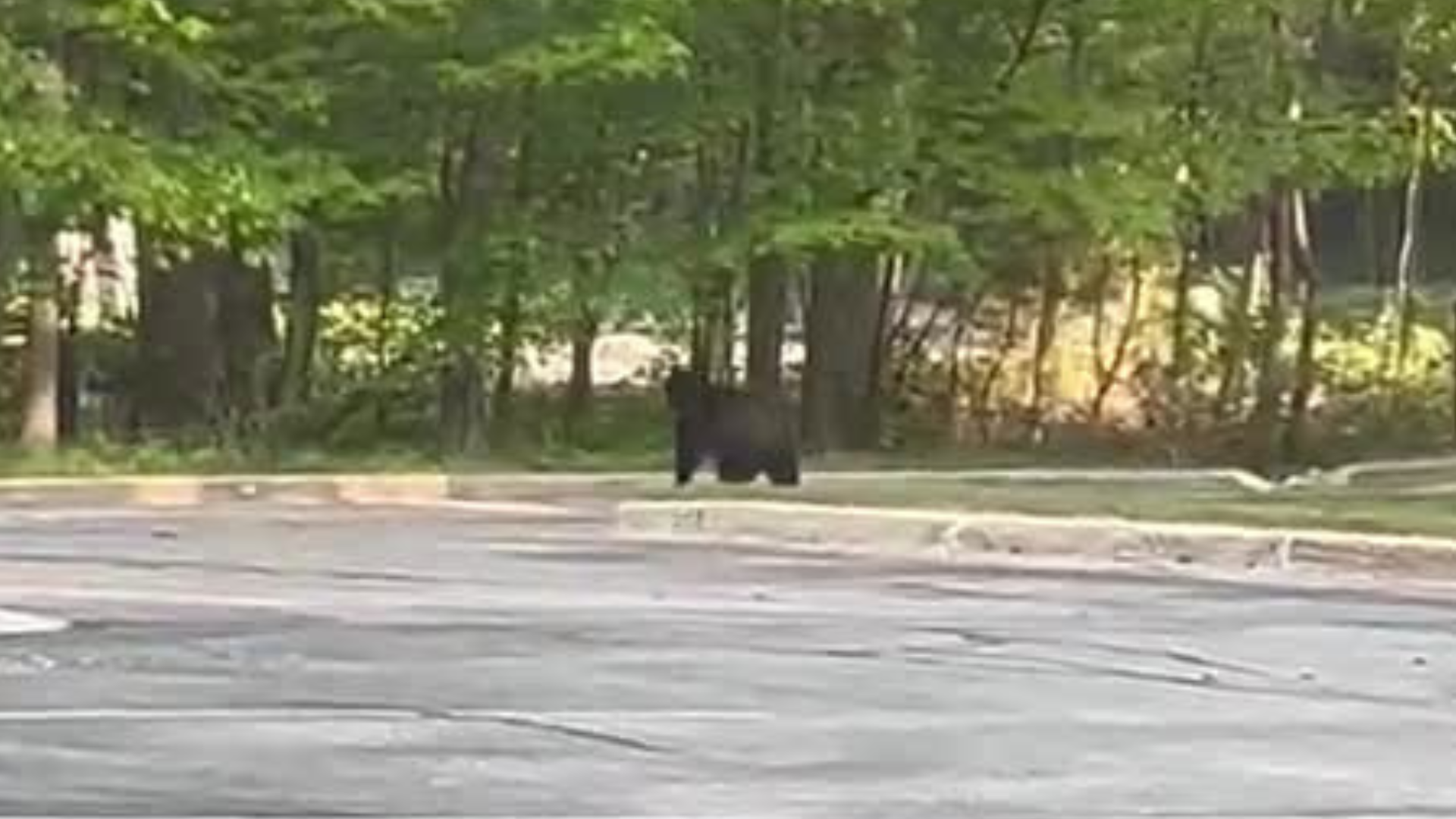UPDATE 5/1/24 12:30 p.m.
CHARLOTTE, N.C. (AP) — United Methodist delegates repealed their church’s longstanding ban on LGBTQ clergy with no debate on Wednesday, removing a rule forbidding “self-avowed practicing homosexuals” from being ordained or appointed as ministers.
Delegates voted 692-51 at their General Conference — the first such legislative gathering in five years. That overwhelming margin contrasts sharply with the decades of controversy around the issue. Past General Conferences of the United Methodist Church had steadily reinforced the ban and related penalties amid debate and protests, but many of the conservatives who had previously upheld the ban have left the denomination in recent years, and this General Conference has moved in a solidly progressive direction.
Applause broke out in parts of the convention hall Wednesday after the vote. A group of observers from LGBTQ advocacy groups embraced, some in tears. “Thanks be to God,” said one.
The change doesn’t mandate or even explicitly affirm LGBTQ clergy, but it means the church no longer forbids them. It’s possible that the change will mainly apply to U.S. churches, since United Methodist bodies in other countries, such as in Africa, have the right to impose the rules for their own regions. The measure takes effect immediately upon the conclusion of General Conference, scheduled for Friday.
The consensus was so overwhelmingly that it was rolled into a “consent calendar,” a package of normally non-controversial measures that are bundled into a single vote to save time.
Also approved was a measure that forbids district superintendents — a regional administrator — from penalizing clergy for either performing a same-sex wedding or for refraining from performing one. It also forbids superintendents from forbidding or requiring a church from hosting a same-sex wedding.
That measure further removes scaffolding around the various LGBTQ bans that have been embedded various parts of official church law and policy. On Tuesday, delegates had begun taking steps to dismantle such policies.
Delegates are also expected to vote as soon as today on whether to replace their existing official Social Principles with a new document that no longer calls the “practice of homosexuality … incompatible with Christian teaching” and that now defines marriage as between “two people of faith” rather than between a man and a woman.
The changes are historic in a denomination that has debated LGBTQ issues for more than half a century at its General Conferences, which typically meet every four years. On Tuesday, delegates voted to remove mandatory penalties for conducting same-sex marriages and to remove their denomination’s bans on considering LGBTQ candidates for ministry and on funding for gay-friendly ministries.
About 100 LGBTQ people and allies gathered outside the Charlotte Convention Center after the vote — many with rainbow-colored scarves and umbrellas — to celebrate, pray and sing praise songs accompanied by a drum.
Bishop Karen Oliveto, the first openly lesbian bishop in the United Methodist Church, was among those celebrating.
“It seemed like such a simple vote, but it carried so much weight and power, as 50 years of restricting the Holy Spirit’s call on people’s lives has been lifted,” said Oliveto, of the Mountain Sky Episcopal Area, which includes Colorado, Montana, Utah and Wyoming. “People can live fully into their call without fear. The church we’ve loved has found a home for us.”
Angie Cox, an observer at the meeting from Ohio, said she has gone before her conference’s board of ordained ministry six times but was “told no just because of the prohibition on LGBTQ clergy.” She said Wednesday’s vote “means I might be able finally to live fully into my calling.”
Tracy Merrick, a delegate from Pittsburgh who has advocated for LGBTQ inclusion at several previous conferences, said with emotion that there were “many times when I thought we would never see this day.”
The vote, he said, enables the church to become “the denomination that many of us had envisioned for years.”
At the same time, the vote comes following the departure of one-quarter of the U.S. churches within the UMC. And it could also prompt departures of some international churches, particularly in Africa, where more conservative sexual values prevail and where same-sex activity is criminalized in some countries.
Last week, the conference endorsed a regionalization plan that essentially would allow the churches of the United States the same autonomy as other regions of the global church. That change — which still requires local ratification — could create a scenario where LGBTQ clergy and same-sex marriage are allowed in the United States but not in other regions.
More than 7,600 mostly conservative congregations in the United States disaffiliated between 2019 and 2023 reflecting dismay over the denomination not enforcing its bans on same-sex marriage and LGBTQ ordination.
The conference last week also approved the departure of a small group of conservative churches in the former Soviet Union.
The church’s 1972 General Conference approved a statement in its non-binding Social Principles that homosexuality is “incompatible with Christian teaching” — a phrase omitted in a revision to the Social Principles that is also headed for a conference vote this week.
The now-repealed ban on clergy who are “self-avowed practicing homosexuals” was originally enacted in 1984, when the conference also voted to require “fidelity in marriage and celibacy in singleness.”
The denomination had until recently been the third largest in the United States, present in almost every county. But its 5.4 million U.S. membership in 2022 is expected to drop once the 2023 departures are factored in.
The denomination also counts 4.6 million members in other countries, mainly in Africa, though earlier estimates have been higher.
4/30/24 5:30 p.m.
CHARLOTTE, N.C. (AP) — United Methodist delegates began making historic changes in their policies on sexuality on Tuesday — voting without debate to reverse a series of anti-LGBTQ policies.
The delegates voted to delete mandatory penalties for conducting same-sex marriages and to remove their denomination’s bans on considering LGBTQ candidates for ministry and on funding for gay-friendly ministries.
The 667-54 vote, coming during their legislative General Conference, removes some of the scaffolding around the United Methodist Church’s longstanding bans on LGBTQ-affirming policies regarding ordination, marriage and funding.
Still to come later this week are votes on the core of the bans on LGBTQ clergy and same-sex marriage in church law and policy, which may draw more debate. However, the large majority achieved by Tuesday’s votes indicate the tenor of the General Conference. The consensus was so overwhelming that these items were rolled into the legislative “consent calendar,” normally reserved for non-controversial measures.
The actions follow a historic schism in what was long the third-largest denomination in the United States. About one-quarter of U.S. congregations left between 2019 and 2023, mostly conservative churches dismayed that the denomination wasn’t enforcing its longstanding LGBTQ bans. With the absence of many conservative delegates, who had been in the solid majority in previous general conferences and had steadily reinforced such bans over the decades, progressive delegates are moving quickly to reverse such policies.
Such actions could also prompt departures of some international churches, particularly in Africa, where more conservative sexual values prevail and where same-sex activity is criminalized in some countries.
United Methodist Church law still bans the ordination of “self-avowed practicing homosexuals” into ministry — a decades-old rule that will come up for a vote later this week.
However, on Tuesday, the General Conference voted to remove a related ban — on church officials considering someone for ordination who fits that category.
It also removed mandatory penalties — imposed by a 2019 General Conference — on clergy who conduct ceremonies celebrating same-sex weddings or unions.
And it imposed a moratorium on any church judicial processes seeking to discipline any clergy for violating LGBTQ-related rules.
In addition, the General Conference took actions toward being openly LGBTQ-affirming.
It repealed a longstanding ban on any United Methodist entity using funds “to promote the acceptance of homosexuality.” That previous ban also forbade the funding of any effort to “reject or condemn lesbian and gay members and friends” and expressly supported the funding of responses to the anti-HIV epidemic. However, the mixed wording of the old rule has been replaced with a ban on funding any effort to “reject any LGBTQIA+ person or openly discriminate against LGBTQIA+ people.”
“It’s a very liberating day for United Methodists who are actively involved with LGBTQ people,” said the Rev. David Meredith, board chair for the Reconciling Ministries Network, a group that has long advocated for LGBTQ inclusion in the church.
Compared with past, contentious general conferences, this one is “much more upbeat,” added Jan Lawrence, executive director of the network. “Yes, we’re going to have things we disagree on. But the vitriol that we saw in 2019, that is not evident at all.”
Other rule changes called for considering of LGBTQ people along with other demographic categories for appointments in an effort to have diversity on various church boards and entities.
The General Conference is the UMC’s first legislative gathering since 2019, one that features its most progressive slate of delegates in recent memory following the departure of more than 7,600 mostly conservative congregations in the United States because it essentially stopped enforcing its bans on same-sex marriage and LGBTQ ordination.
Those departures came during a window between 2019 and 2023 allowing them to leave with their properties, held in trust for the denomination, under friendlier than normal terms. Conservatives are expected to ask that such terms be extended for international and U.S. churches that don’t agree with the General Conference’s actions.
Still to come this week are final votes on whether to remove the bans on LGBTQ clergy and same-sex marriage, and whether to whether to replace a longstanding document that had called the “practice of homosexuality … incompatible with Christian teaching.”
All of those proposals had overwhelming support in committee votes last week.
The changes would be historic in a denomination that has debated LGBTQ issues for more than half a century at its General Conferences, which typically meet every four years.
Last week, the conference endorsed a regionalization plan that essentially would allow the churches of the United States the same autonomy as other regions of the global church. That change – which still requires local ratification -- could create a scenario where LGBTQ clergy and same-sex marriage are allowed in the United States but not in other regions. Delegates on Tuesday approved a related measure related to regionalization.
The conference last week also approved the departure of a small group of conservative churches in the former Soviet Union.
The denomination had until recently been the third largest in the United States, present in almost every county. But its 5.4 million U.S. membership in 2022 is expected to drop once the 2023 departures are factored in.
The denomination also counts 4.6 million members in other countries, mainly in Africa, though earlier estimates have been higher.


